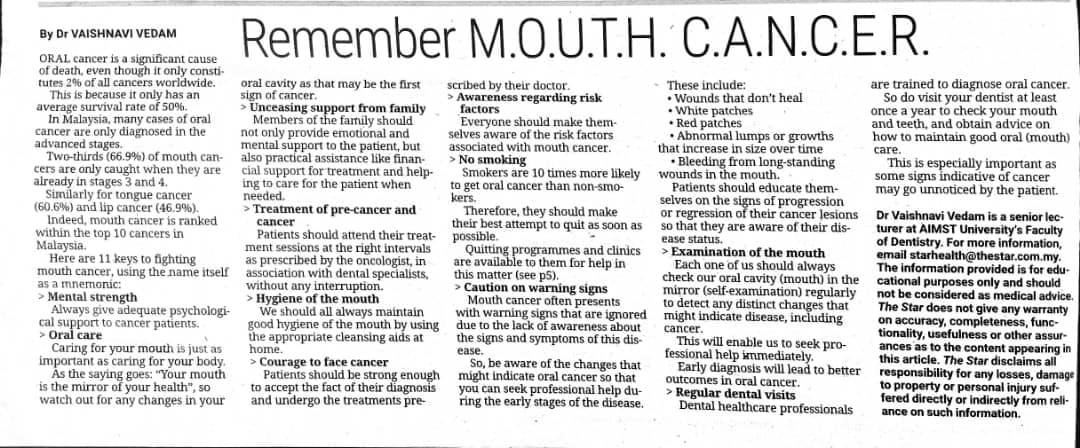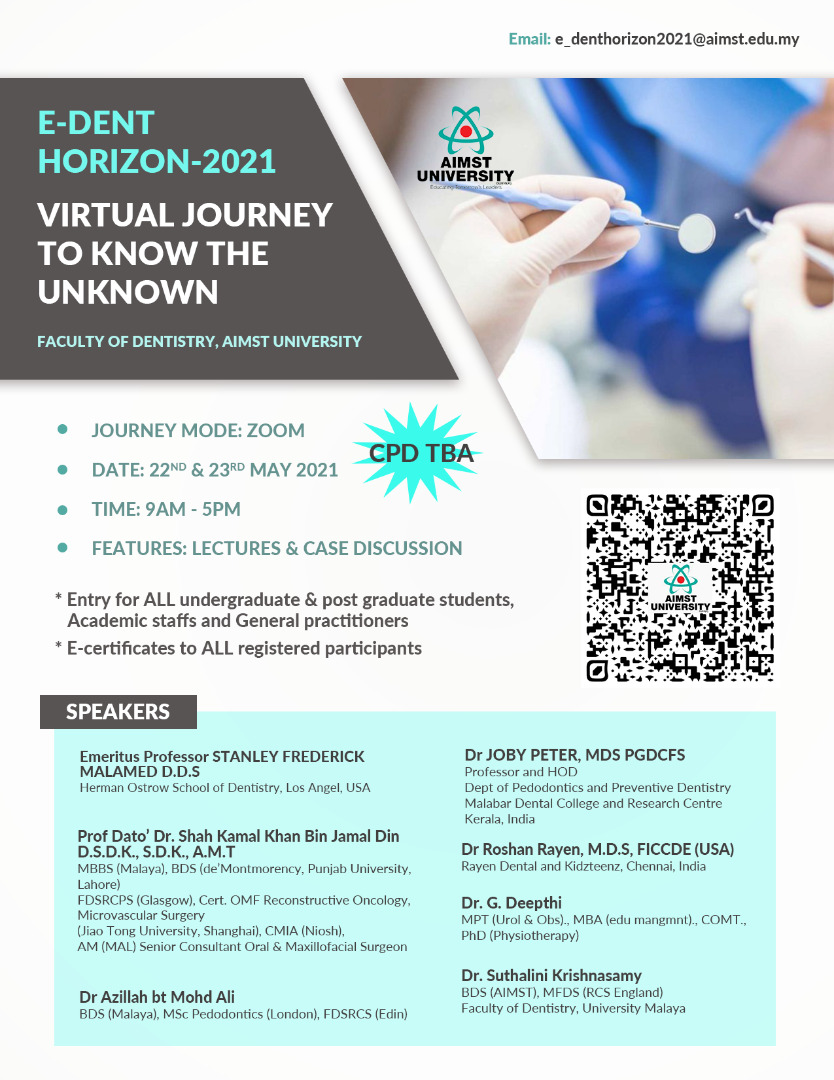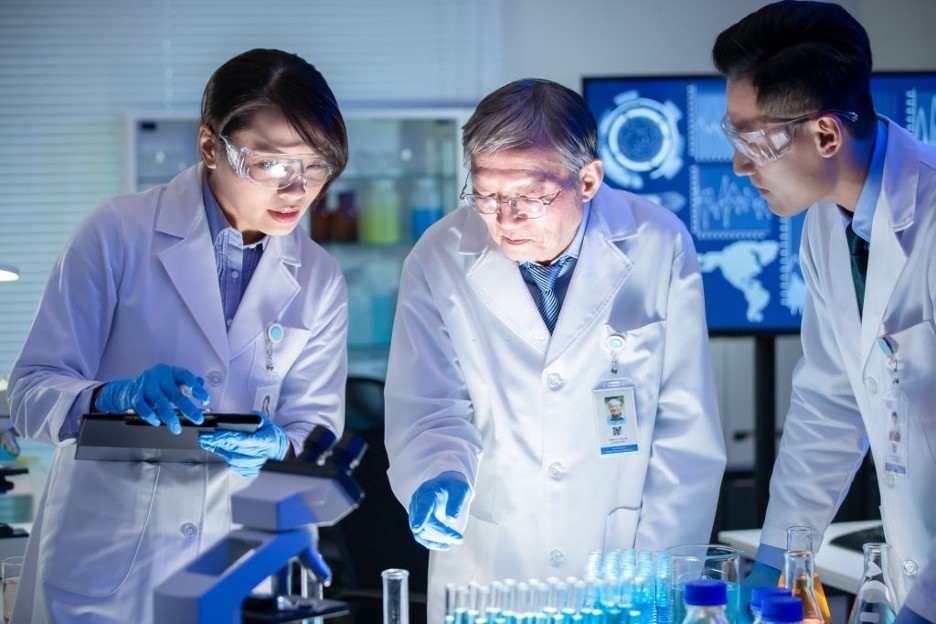Remember M.O.U.T.H. C.A.N.C.E.R.
Dr. Vaishnavi Vedam, a senior lecturer at AIMST University’s Faculty of Dentistry has contributed an article on ‘Remember M.O.U.T.H. C.A.N.C.E.R.’ in The Star’s weekly column of StarHealth on 30th May 2021.
Fascinatingly, the dental lecturer has outlined 11 keys to fighting mouth cancer, using the name itself as mnemonic- ‘M.O.U.T.H. C.A.N.C.E.R.’ Dr. Vaishnavi Vedam has also contributed some important statistics on oral cancer in Malaysia.

The only thing constant in life is change
Vaccinating against infodemic
‘E-DENT HORIZON-2021 Virtual Journey to Know the Unknown’
A dental webinar will be held on 22nd & 23rd May 2021 by the Faculty of Dentistry AIMST University. The webinar, ‘E-DENT HORIZON-2021 Virtual Journey to Know the Unknown’ will feature eminent speakers from Malaysia, the USA, and India.
The webinar will consist of lectures and case discussions with specialists involving multiple specialties in Dentistry and will apprise dental students and young dental graduates on the pathways in attaining a Master’s degree in dental specialties and international fellowship.
E-certificates will be given to all participants while CPD-TBA points will be awarded to eligible participants. Please find more details in the attached poster.
For further enquiries please email e_denthorizon2021@aimst.edu.my

STAR EDUCATION FAIR
Venue: KLCC Date: 22 & 23 May Time: 12pm -6pm
Tackling airborne virus transmission
AIMST Info Day 2021
Join our campus tour, briefing of scholarships, mini-experiments, demonstrations and many more. 3 - 6 May 2021 (Monday to Thursday) 9am - 4pm Click here to book your slot
The Future of Biotechnology Industry After Covid-19
Health-care professionals, public-health experts, government leaders, investors (and the general public) were looking to the biotech industry to develop a "game-saving" vaccine against the novel coronavirus amid the confusion and fears surrounding the COVID-19 outbreak. The biotech industry has played a critical role in developing and shipping COVID-19 vaccines in record time. Leaders from the Biotechnology Innovation Organization (BIO) have said that biotech's role in the pandemic — and the pandemic's role in shaping the industry, the environment, and innovation — will not go away once the vaccines are administered to the public.
A Shift of Focus to Infectious Disease Research
During the COVID-19 pandemic, a large number of biotechnology companies shifted their focus to infectious disease research. Until 5th Jan 2021, there were 191 COVID-19 vaccine candidates in progress and over 800 clinical trials for various drugs and vaccines, many of which are being developed by companies with no previous experience in the infectious disease sector. Regardless of whether these attempts by small and large biotechnology companies are eventually fruitful, they should be commended. The complexity of COVID-19 disease has allowed a role for many types of drug mechanisms to be effective, according to Dr. Michelle McMurry-Heath, Ph.D., president, and CEO of BIO. In terms of new therapeutics and vaccines, we are only beginning to see the benefits of this new emphasis. As a result of the pandemic, organizations that have shifted their focus to infectious disease research will explore new clinical groups and research areas. McMurry-Heath pointed out that just 20 years ago, the industry was still learning the basics of immunology. Immunology is now understood to be central to all and to apply to all diseases. There is hope for even more ground-breaking solutions in the future if companies are innovative and eager to rethink their research.
Long-term Implications
In terms of the biotechnology industry's long-term implications, McMurry-Heath and Dr. Jeremy Levin, Ph.D., CEO of Ovid Therapeutics and chair of BIO's board of directors, both agreed that it is a new age, an opportunity to reset the industry and set standards on how quickly science will respond to societal needs. According to Dr. Levin, now is the time for the biotechnology industry to create bridges with policymakers and agree that the industry is critical to the nation and the world. He believes that for policymakers to cope effectively with the chaos of a pandemic, they must recognize the industry as a critical frontline resource and give it "primacy at the table."As We Advance
Some new inventions seem to be more likely than others to have a long-term effect. Here are four to think about.1. Virtual Trials
Digital trials are likely to become the rule, rather than the exception, in the not-too-distant future, given the concerns about clinical trial interruptions and postponements. Virtual visits, phone interviews, self-administration, and online control are among the FDA's latest recommendations. These modifications were in effect during the phases of quarantine, travel restrictions, and closures, and the new protocols may become permanent over time.
2. Friendly FDA
Biotech companies should expect a warm welcome from the U.S. Food & Drug Administration (FDA). The agency's annual approval rate for new drugs has more than doubled in the last decade, hitting 48 last year. There's no reason to think the pattern would reverse. This is great news for biotech companies and their pipelines.3. Scrutiny of Imports
Imported drug goods are being scrutinized more closely at U.S. ports of entry, and it's difficult to see the U.S. abandoning that standard in the future. The FDA warns that it can refuse to allow dangerous goods into the country, perform physical examinations and product samplings, check a company's past enforcement history, and request records ahead of on-site drug inspections.4. Restructured Supply Chains
Companies based in China are important parts of foreign supply chains in a variety of industries. One of them is biotechnology. Pricing, subcontracting, and other factors have all led to the structure's development and entrenchment. The disruption generated by COVID-19 has now highlighted the unparalleled country danger that has been created as a result of the procedure. Efforts to regionalize supply chains, create second sources, and build proprietary stockpiles are anticipated.Final Thoughts
These new advancements have brought about a positive development for industry players, from graduates with a Bachelor of Biotechnology to those in medical biotechnology and biotechnology engineering and the investors. The future of the biotech industry post-covid-19 is full of great opportunities for everyone involved.Research Mode or Mixed/Coursework Mode for Postgraduate Programs?
Postgraduate programs may be either coursework or research-based. There is a significant difference between these two types of programs, and one could be better suited to your objectives than the other.
Course-based Masters Degrees are taught through lectures, lab work, workshops, or distance learning, while research-based Masters Degrees enable students to conduct their research projects in a specialized area. Research-based postgraduate programs usually take longer to complete than course-based programs.
Continue reading to learn the main differences between course-based and research-based master's degrees, and hopefully, this article can assist you in deciding which is best for you.
Coursework programs have a structure that includes core, elective, and optional units, and they include enrolment in these units, attendance for all scheduled classes, and assignment completion.
Online study is now available for some postgraduate courses, and attendance is not needed. The majority of coursework-based master's programs provide study and may include the completion of a minor thesis.
On the other hand, research-based programs are awarded after completing a major thesis, which entails conducting independent original research under the supervision of a senior academic.
Students may complete additional units to broaden their knowledge, although this is determined on a case-by-case basis. Reports from students/supervisors to the appropriate graduate studies committee evaluate course progress rather than mandatory assignments.

Coursework-based Masters or Taught Master’s Degree
Master's degrees that are taught are identical to undergraduate degrees. They consist of lectures, practical’s, and work seminars that offer a series of taught modules. You will be evaluated on the skills and expertise you have gained after completing these modules. Coursework, tests, community tasks, and dissertations are used to assess students. Depending on the subject of research, you will be awarded a Master of Arts (MA), Master of Business Administration (MBA), or Master of Science (MSc) degree after your course. In contrast to popular belief, an MBA is purely a coursework-based program (not a research-based program).Research-based Master’s Degree
Master's degrees in science include learning by research. Many funding bodies only grant money to Ph.D. students who have completed research programs, so research-based degrees are seen as useful training for pursuing Ph.D. studies. If you're considering to study master's, you will need to work independently because you won't get as much tutoring as you will on a coursework-based degree. Supervisors, on the other hand, will provide you with assistance in developing your research proposal. You would aim to get your work accepted for publication in a prestigious research journal. A professional judgment of your research work and a verbal test related to your research subject is used to assess research programs. Depending on the topic of study, you will receive a Master of Research (MRes), Master of Philosophy (MPhil), Master of Science (MSc by Research), or Master of Arts (MA by Research) degree after your course.
Should I pursue a coursework-based or research-based master's degree?
Your choice of the postgraduate program should be driven by your career ambitions, academic preferences, and preferred learning style. A taught postgraduate course, such as an MA or MSc, could be best for you if you want to obtain more advanced subject knowledge and an additional qualification before entering the job market. An accredited coursework program will be more beneficial if you have a particular career in mind. A Postgraduate Certificate or Diploma is most common, but a full taught course, such as a Masters of Social Work or a Legal Practice Course, can also be offered. If you want to do academic research or work in a field where research skills are essential, an MRes is a good option. This will encourage you to concentrate on a solo project to learn research skills or to assess whether a longer research degree (such as a Ph.D.) is likely to appeal to you. Suppose you want to pursue a career in academia. In that case, you may be able to enrol in an MPhil program after completing your undergraduate degree and then upgrade to a Ph.D. after making adequate progress.In a Nutshell
If you're wondering which postgraduate mode (research or coursework Masters) will allow you to go for your Ph.D., then you should know this. Most Ph.D. programs ask that applicants have any Master's in an appropriate subject. So, whether you pursue a Research-based or Coursework Master's degree, if you meet the various admission criteria, you would be able to pursue a Ph.D. To find out more about the postgraduate programs at AIMST University, a prestigious medical university in Malaysia, feel free to get in touch with our friendly counsellors.International Nurses Day (12 May) and Florence Nightingale
Every year on May 12, the world commemorates International Nurses Day. It commemorates Florence Nightingale's birth, who was born on May 12, 1820. The founder of modern nursing, Florence Nightingale, was an English social reformer, and statistician. During the Crimean War, Nightingale rose to prominence as a manager and teacher of nurses, organizing treatment for wounded soldiers in Constantinople. She popularized nursing and became a symbol of Victorian culture, especially as "The Lady with the Lamp," who made night-time rounds of wounded soldiers. Every year, the International Council of Nurses (ICN) selects a theme and produces IND resources and facts to educate the public and encourage nurses. Some of those resources include reports, case studies, posters, videos, interviews, and social media banners and logos. The theme for International Nurses Day 2021 (IND2021) has been decided by the International Council of Nurses as 'Nursing The World Back to Health,' emphasizing the 'true value of nurses to the people of the world. The sub-theme being 'A Vision for Future Healthcare'.
The IND2021 Theme
The IND2021 theme reflects the effect of COVID-19 on the healthcare system and nursing profession and how both could be influenced in the future. As the largest healthcare sector, nurses must be involved in the planning of the industry's future. "The global COVID-19 pandemic has shown to the world the critical role that nurses play in keeping people safe throughout their lives," said Annette Kennedy, President of the International Council of Nurses. "While there has been a lot of change in the healthcare industry, there has also been a lot of creativity that has increased access to treatment. We'll be focusing on nursing improvements and advancements in 2021 and how they'll impact the future of healthcare." Annette said.How it Started
 Modern nursing, which we now take for granted, was not always so organized until Nightingale arrived on the scene. Nightingale had volunteered to nurse British and allied soldiers in Turkey during the Crimean War, much against her family's wishes. After hearing horrifying stories of how injured allied troops were being treated inhumanely, she and her team braved the difficult terrain.
Nightingale spent a lot of time in the hospitals, and her night rounds, which she did with one hand holding the lamp aloft while giving personal attention to the injured, established her as the "Lady with the Lamp." She worked hard to make nursing education more formal. In 1860, she helped found the Nightingale School of Nursing at St. Thomas' Hospital in London, which was the first scientifically based nursing school.
The Florence Nightingale Pledge, taken by new nurses, and the Florence Nightingale Medal, the highest international distinction a nurse can receive, were named in her honour. The annual International Nurses Day is held on her birthday in memory of her pioneering work in nursing. Her social reforms included:
Modern nursing, which we now take for granted, was not always so organized until Nightingale arrived on the scene. Nightingale had volunteered to nurse British and allied soldiers in Turkey during the Crimean War, much against her family's wishes. After hearing horrifying stories of how injured allied troops were being treated inhumanely, she and her team braved the difficult terrain.
Nightingale spent a lot of time in the hospitals, and her night rounds, which she did with one hand holding the lamp aloft while giving personal attention to the injured, established her as the "Lady with the Lamp." She worked hard to make nursing education more formal. In 1860, she helped found the Nightingale School of Nursing at St. Thomas' Hospital in London, which was the first scientifically based nursing school.
The Florence Nightingale Pledge, taken by new nurses, and the Florence Nightingale Medal, the highest international distinction a nurse can receive, were named in her honour. The annual International Nurses Day is held on her birthday in memory of her pioneering work in nursing. Her social reforms included:
- Expanding the appropriate types of female participation in the workforce.
- Improving healthcare for all parts of British society.
- Campaigning for better hunger relief in India.
- Helping to dismantle harsh prostitution laws for women.
A multi-talented author
Nightingale was a prolific and multi-talented author. Most of her published work during her lifetime was devoted to the dissemination of medical information. Some of her tracts were written in plain English so that even those with limited literacy skills could understand them. She was also a pioneer in data visualization, using infographics to display statistical data in a graphical format easily. Many of her works, including her extensive work on faith and mysticism, were only published after passing away. Not surprisingly, Nightingale was the first woman to receive the British Empire's Order of Merit (1907).
How is International Nurses Day Celebrated?
Countries around the world commemorate this day in their unique ways. In the United Kingdom, for example, each year, a service is held in Westminster Abbey in London during which a symbolic lamp is passed between nurses until it enters the Nurses' Chapel, where it is then placed on the High Altar. This represents the transmission of information from one nurse to the next. Both graduates (including those with a bachelor of nursing degree and a diploma in nursing) and undergraduates studying a nursing course across the world also celebrate May 12 in various ways in their schools.In a Nutshell
The contribution of Florence Nightingale to mankind is undeniable. And that’s one of the reasons why many are joining the nursing workforce every year. For those who are inspired by the story of Florence Nightingale and aspire to be a nurse one day, feel free to check out the nursing course (including Bachelor of Nursing Degree and a Diploma in Nursing) offered by AIMST University.Electric Vehicle (EV) Trends for Now and Beyond
The global automotive industry has recently shifted development trends away from conventional mechanical powertrain components and toward digital transformation of electrification components in advanced propulsion vehicles. For those in engineering programs like electrical and electronic engineering, mechanical engineering, etc., this is good news. This industrial influence on global growth trends in automotive electrification designs has resulted in developing new propulsion systems such as hybrid electric vehicles (HEV) and electric vehicles (EV). Here are some of the key trends shaping the EV industry today and in the years to come.
1. Advanced Creative Design
Buyers of electric vehicles today have high expectations. They expect cutting-edge technology under the hood and beautiful architecture, efficient space utilization (including for batteries and fuel cells), a wide range of options, and, of course, excellent safety standards. To meet these demands, EV manufacturers are using next-generation Product Lifecycle Management (PLM) to increase vehicle variants while reducing production times and product lifecycles.2. Intelligent Vehicles
Fleets and private users alike are interested in autonomous, self-driving cars. Take, for example, Einride, the Swedish company behind the T-pod and T-log, which has built a system that allows a single operator to remotely operate several self-driving trucks at the same time, eliminating the need for a massive, full-time team of operators and drivers. This degree of productivity is reshaping the whole industry.3. Increased Range
As compared to ICE vehicles, EVs face a significant disadvantage in terms of range. While ICE has a lower overall operating cost, it still has an advantage in refuelling options, speed, and convenience. Electric vehicles (EVs) take much longer to charge and run out of fuel much faster. Developers are testing various solutions, including transitional options, including range-extending hybrids, and interesting long-term options like the solar-powered vehicle. [caption id="attachment_7266" align="alignnone" width="3555"] Source: EV-Volumes[/caption]
Source: EV-Volumes[/caption]
4. Rising Electric Vehicle Production
EVs could be less expensive to operate and maintain than conventional automobiles. Unsurprisingly, this makes them more appealing to buyers, resulting in increased demand for more EVs in a wider variety of models. Since the EV powertrain is a basic, largely interchangeable feature, OEMs can concentrate on other specifics, customer needs, and niche markets without thinking too much.5. Electrify ICE
EVs have become so common that even existing ICE behemoths are considering making their ICE-powered vehicles hybrid or fully electric. EV design teams are looking beyond EV-only goods to capitalize on this trend. The best are using sophisticated PLM techniques to determine how to function smarter, test their designs, and simulate various scenarios to see how their concepts can be quickly and easily adapted for ICE-to-EV conversions.6. Self-driving Cars
Many electric car makers have already made substantial progress in the field of self-driving technology. EV manufacturers like Tesla, Toyota, Peugeot, and a slew of others are pushing hard to make this possible for the vast majority of drivers soon. This will not only make long drives more convenient for commuters, but it will also potentially make our roads safer. Once established as a global norm, it is likely to eliminate many conventional jobs such as taxi drivers, chauffeurs, and long-haul lorry freight operators, putting pressure on newer careers such as Uber drivers. However, when one door closes, another opens, and the drastic shift could result in fresh, previously unimagined job opportunities.
7. Solar-powered EVs
Another interesting technical trend to keep an eye on is solar-powered vehicles. Many businesses are now trying to make solar vehicles a reality soon. Allowing the car's battery to be charged when driving may be a game-changer for the EV industry. There are already some intriguing prototypes in the works.In a Nutshell
Finally, technological improvement and innovation will be another theme to watch. Things like connectivity, safety, information, and in-car entertainment should see some interesting innovations. Connectivity, for example, will be critical for safer autonomous vehicles. For graduates with a bachelor of electronic engineering degree, the EV industry trends can mean more job opportunities.‘Leadership skills inspired from Nature’
Leadership and team skills among students are emphasised by the Malaysian Qualification Framework (MQF). Hence, leadership skills must be acquired by students through their role models who will also help students in mentoring their career skills. In line with this, Dr. Gokul Shankar Sabesan, who is a Senior Associate Professor and Deputy Dean (Student Affairs) at the Faculty of Medicine has come up with a write-up on ‘Leadership skills inspired from Nature’. According to Dr. Gokul, there are amazing leadership traits that are exhibited by certain animals which could serve as models to emulate. Hence, leadership skills incorporated in curriculum helps in the growth and success of students. The article was published in the ‘Letters to the Editor’ section of the News Straits Times (NST) on 27th April 2021. Click https://www.nst.com.my/opinion/letters/2021/04/685846/leadership-skills-inspired-nature to read.

